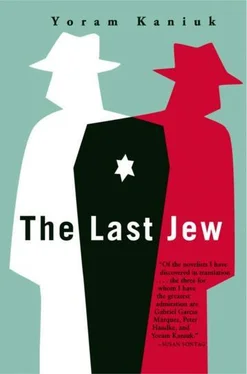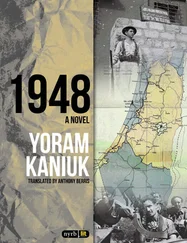From Kramer's diary! said the German, unable to hide a thin smile that capered for a second in his eyes.
Tell me about Samuel!
The writer put his glasses back on and scanned the papers.
… Once we played chess. And I beat Ebenezer in five games. Sometime later he asked me to play with him again. I said to him: We played and I beat you but you don't remember anymore. We played a little and he beat me four games in a row. After I racked my brain I discovered that all his games were copies of the games played by famous grandmasters. Somebody transferred some more "Jewish knowledge" to him and I laughed. I liked to look at him, at his hand, at his spirit that moved it. An earthly technical link to a celestial melody. I didn't know but I wanted to be a witness to creation. A witness to the emergence of art. An exalted character is the character of the spectator. Who knows how to see. I called him by name. I also knew Samuel's name and that was almost strange. For us they were numbers, every single one was a number, and nothing else, just like the woman who cleans her house, and-here I quote the Reichsfuhrer-doesn't call the vermin she burns by name. But I couldn't sit for long days with a number without a name. My generosity to him was so simple in its ardor that I couldn't aggravate its rarity anymore. Ebenezer met Samuel Lipker on the day a German civilian, a worker in the camp and a rather decent man named Hans Taufer, shot an apple he held in the mouth of a girl they called Bronya the Beautiful. That was at a discharge party for one of the commanders who was afflicted with a serious liver disease, and in those days, the days of the shameful and unnecessary retreat from Stalingrad where the generals betrayed the Fuhrer and brought upon us the most awful disaster. In those days a party was a plausible excuse to dissipate the amassed gloom a little. It was a lovely dusk, drawn out and reddish, proper and wild in equal measure. Samuel Lipker was part of the Sonderkommando. He was burrowing-that fact I don't know from my own eyes but secondhand-in the mouth of a corpse, found a forgotten gold tooth and hid it. At that time, Ebenezer was standing next to the wire fence whose pillars curved in (I once told Weiss it would be good to create pillars that would look like they were crying outside and not inside) and then the shot that killed Bronya the Beautiful was heard. Hans Taufer didn't kill her on purpose. He was drunk and his hand shook. Ebenezer bent down and Samuel, who was burrowing in the teeth of the dead, also bent down low. Everybody knows how Jews bend down when they hear shots. Their famous survival is ultimately a bovine fear. When they bent over and looked at the window where Bronya the Beautiful was shot each recognized the other. Maybe they smelled, as a trapped animal smells its companion. Samuel crawled to Ebenezer. He gave him a piece of greenish bread, spat on it, and Ebenezer chewed. Samuel evoked longings in Ebenezer, as he told me later. When he saw that evasive and cunning lad he understood he wouldn't be the only one who would give up his life. A terrifying sense that surely also excited him. When he told me, I felt a kind of envy I was forbidden as an SS officer. I envied the love of the beetle for the flea. And because I write only truth I have to examine that. Maybe in Ebenezer's relation to me I was seeking something denied me, I was always flooded by the chill hard hatred of those around me. Even the last sight of the Jews wasn't especially likable. Weiss was busy with his miserable oratorio, drinking wine, and his endless meditation on the distant landscapes. The Ukrainians and the Germans with us were dreadfully simple and coarse. None of them had hands that could shape a box like a Grunwald drawing, a declaration of celestial disbelief in the cosmos and also a disappointed praise of God, and Ebenezer's love was kindled at the sight of a lad who was constantly busy rummaging in the mouths and testicles of corpses that were later burned. Their attraction to one another was for a past that was fictional but absolute as far as they were concerned. The spark that engendered love was, as I said, the sight of the dead Bronya.
And she died very slowly. In the window the sergeants' girl could be seen bowing as if she were made of iron. Very slowly she bent down, very slowly she died, when I wrote to Berlin about that whore, a few months before that (she was indeed the most beautiful girl I had ever seen except for some woman I once saw in a settlement in Palestine, and today I know she's Ebenezer's mother but then of course I didn't know) I didn't get a real answer. The reply I did get stated that I deserved praise for strict preservation of the exalted sexual practices of the German race, but… somebody wrote there, a fuck from behind or in front doesn't matter so much in certain cases of pressure, it said there, an SS sergeant is permitted to relax in one way or another (without specification) that letter was written to me at the height of the contemptible air attack of the Americans, surely of Jewish origin, who didn't understand what their leaders did, that what we were doing here was not only for the Third Reich, but for the whole civilized world. A testimony to their leaders' reconciliation with our acts and vice versa, how hypocritical the way we're punished now, when there are no more Jews in Europe and they may roar in public. When there were a lot of Jews alive they were afraid they'd knock on their locked doors.
They saw Bronya the Beautiful bleeding. The apple (as I understood) had dropped out of her mouth. She stood naked and the apple was supposed to look amusing in her mouth, and the shot was supposed to pass by her upstretched hand, but Hans Taufer missed. What amazed Ebenezer, as he told me later, when he quoted the story from Samuel who saw it along with him, was that after the shooting Bronya was still standing, even though she was surely already dead. A soldier started photographing her, bent over and photographed her from below, an officer named Kassinpoppinger who once called me "a dark and handsome man," photographed her from the top of the window where he had climbed earlier, Samuel told Ebenezer: She's disguised with blood, and Ebenezer remembered those words as "Jewish knowledge," a wise saying about the disguise of blood, she couldn't even die as a human being but had to stop time and drop very slowly, permeate with dread the brains of sergeants who fucked her from behind. She stood, Ebenezer told me, as if the officer who photographed her from on high was a magnet pulling her up, as a kind of revolt against the law of gravity of the earth, as if it wasn't possible for her to fall. And only after she froze in her death did she land and disappear from the eyes of the two observers, Samuel smiled wickedly and said: Bronya the Beautiful. He loved her. He didn't want to waste tears where the death of Bronya the Beautiful was a technical error of a German soldier who, despite everything known about him, was liable to miss his aim, a disaster happened, Ebenezer thought then (and Samuel remembered and told him), and Samuel doesn't know who the disaster happened to.
And then Ebenezer took Samuel to our alcove and showed him our birds, the boxes that were almost done, the grandfather clock, the frames, and for the first time since the boy Samuel had come to the camp, he said to Ebenezer (who told me), he felt life inside him, something dim bubbled up in him, agitation over Bronya's death and joy over the possible flight of wonderful wooden birds, as if he understood for the first time, he said, that there was something in imagination to fly away from here, and that there was someplace to fly to, that is another realm, beyond the fences. In other words: hope, the last thing somebody could have expressed, was starting to bubble up in him.
Ebenezer now said: He loved her. And they were shooting pictures all the time. I recall, that was scary, how much they shot pictures of her dead, and Samuel loved her. She loved him, too. Wildness, real wildness and joy. The soldiers and guards also loved Samuel. He had demonic eyes, like a phony gold ring. When he saw a phony ring he'd get excited and angry. As if he were looking in a mirror. Like a panther he'd stride there, bury and burn corpses, and seek in the bodies and find gold teeth or diamonds in rectums. Even there he bought and sold! As he did with me after the war when he dragged me to nightclubs and would sell my memory… When he got to the camp, maybe a few months afterward, maybe not there but in Birkenau, he saw his parents. They were naked. He never saw his parents naked and he was scared. He couldn't believe he'd see them naked. Their nakedness was too deep a betrayal. They were glazed and always dressed, impermeable, not connected to their bodies, to toilets, to jokes, to sleeping together, he thought they slept like two glass statues. On his father's face was a frozen smile as if a split second before his death he still thought, Ah, what a stupid joke! And so Samuel turned into a cat of corpses. Between his dead father's testicles he found a diamond. That was a strange gift of a strict father. Samuel knew how to plot, to walk between the drops, and the guards loved to touch him, he didn't care. Until he saw my birds. Sometimes they did things to him, he didn't see and he didn't hear. So they didn't kill him because of their rage, as usual, didn't crush him with an ax as they did to one child I saw, after they abused him.
Читать дальше












